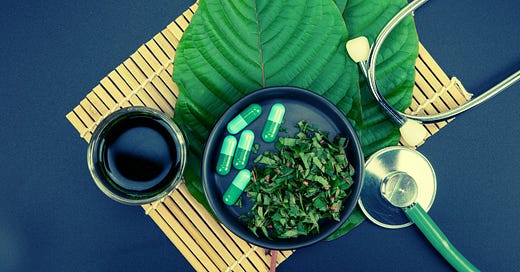Depending on what you read, who you listen to, and which experts you defer to, you can get a remarkably different idea about the dangerousness or benefits of kratom.
One school of thought holds that kratom is an accessible pathway out of undertreated chronic pain and opiate withdrawal, which can safely improve mood. Others believe that kratom is a dangerous, unregulated, addictive drug with no medical utility and severe side effects, including addiction, overdose, and death.
These two views are about as far apart as you can get on an issue. How can millions of regular kratom users, the US Drug Enforcement Agency (DEA) and medical professionals have such divergent views of the same plant?
Is either point of view fully accurate? How do we factor in that it is difficult to come up with a sensible opinion on any drug in a culture that’s been assaulted by a half century’s War on Drugs, which tends to shift the dialogue toward distorting facts and exaggerating harms?
What is kratom?
Kratom (Mitragyna Speciosa) is a tropical tree related to the coffee family native to Southeast Asia, with properties that range from stimulant-like, energizing and uplifting, to opioid-like, causing drowsiness, constipation, and euphoria. Kratom has dozens of active components, which makes it difficult to characterize as one particular type of drug such as a "stimulant" or an "opiate." The two main chemicals, mitragynine and 7-hydroxymitragynine, have strong activity at the main opioid receptor, the "mu" receptor, which is the same one stimulated by narcotics such as heroin and oxycodone.
Kratom is commonly consumed orally, such as made into a tea, with added sweetener to overcome its utterly disgusting bitterness (in my opinion…) or swallowed as a pill. Side effects that have been cited include agitation, tachycardia, drowsiness, vomiting, and confusion. There can also said to be grave side effects such as seizures, as well as respiratory and cardiac arrest. Deaths have been reported from kratom.
Kratom can be found in gas stations, smoke shops, and paraphernalia shops in most parts of the US, except in the handful of states and cities that have banned it. Many people purchase kratom over the Internet, where it typically is sold "for soap-making and aromatherapy" to avoid the fact that in 2014 the FDA made it illegal to import or manufacture kratom as a dietary supplement. The sites say, ‘not for human consumption, wink wink, nod nod.’
Keep reading with a 7-day free trial
Subscribe to Grinspoon on Drugs to keep reading this post and get 7 days of free access to the full post archives.





